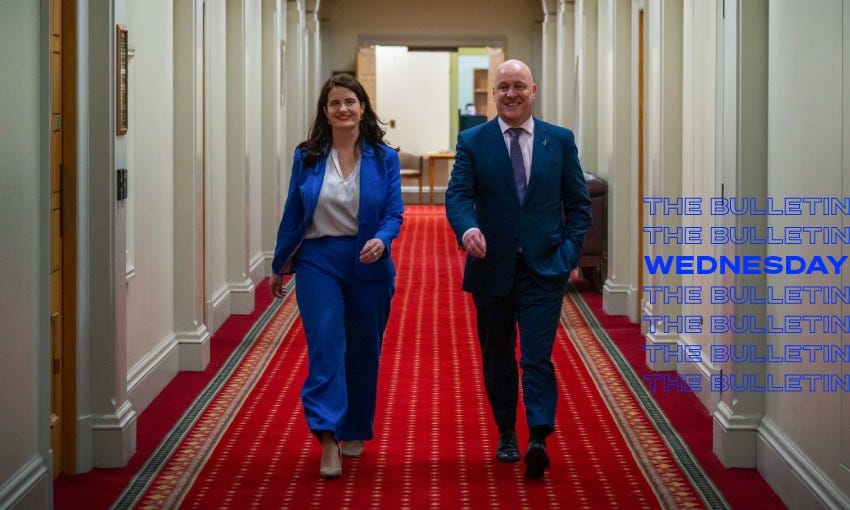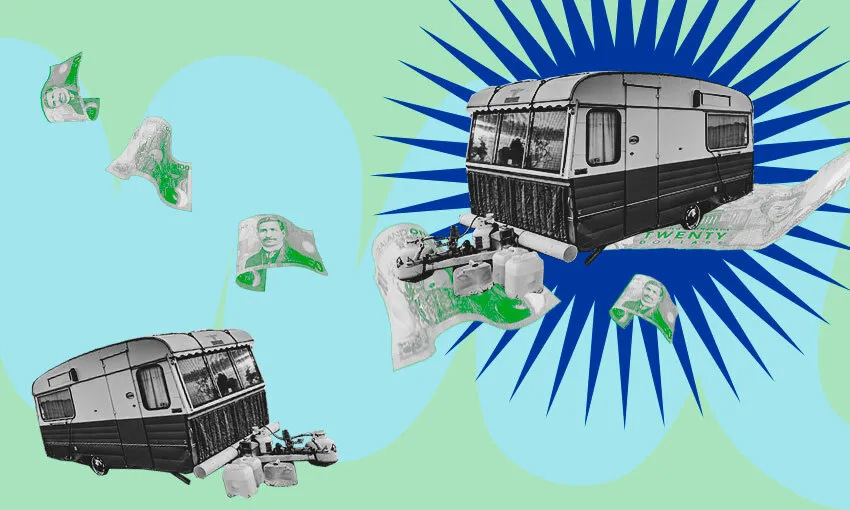Chris Luxon’s plan for the National party
The former Air New Zealand boss now has control of the official opposition, he promises to create a ‘government-in-waiting’ after years of chaos in National
Mōrena and welcome to The Bulletin for Wednesday, December 1, by Justin Giovannetti. Presented in partnership with Z Energy.
In today’s edition: Backtrack on freedom camper ban; omicron fears hit MIQ lottery; Dunedin’s coastal retreat; but first, the National party’s new leaders.
National’s new leadership team, deputy Nicola Willis and leader Chris Luxon. (Supplied)
“We are the reset”. Five days after the National caucus voted to end Judith Collins’ tumultuous tenure as leader, Chris Luxon has fulfilled his long-expected role and taken the helm of the official opposition. After two years of chaos in the party, Luxon has taken the job much earlier than he’d planned. First elected to parliament only 409 days ago, he has the least political experience of any party leader in the country’s modern history. As Toby Manhire reports in The Spinoff, Luxon appeared alongside Nicola Willis, his new deputy, an hour after caucus elected him yesterday and promised New Zealanders that “National is back”. He asked voters who have deserted the party in recent years to give it a second look.
How it all came about. Just over an hour before the National caucus planned to meet yesterday, Simon Bridges dropped his hunt for the leadership. The party was deeply divided, with both men controlling about half of caucus. In a sign of dysfunction, National booked two rooms at parliament for a press conference when neither man could agree on where they wanted to face the media as leader for the first (or second) time. As Newsroom reports, Bridges’ decision averted a contested ballot and spared National from further public disunity. Appearing after his appointment, Luxon said he was frustrated by suggestions his friend and mentor Sir John Key helped. “I am not John Key,” he said.
So who is Chris Luxon? The new National leader is basing much of his political credibility on his business career. In his first speech as leader, Luxon said: “I have built a career out of reversing the fortunes of under-performing companies and I’ll bring that real-world experience to this role.” However, aviation experts questioned Luxon’s description of his time as chief executive of Air New Zealand, reports Stuff. He inherited a profitable and well-run company, and then rode one of the greatest travel booms in history. His only other notable experience is as a manager at the Canadian subsidiary of Unilever. However, there’s been no indication he was ever in any position to “reverse the fortunes” of the successful global giant. He was very well remunerated and told RNZ that he now owns seven houses, while playing down his socially conservative views. As the NZ Herald (paywalled) writes, Luxon will need to hope his fortunes in politics mirror those in business, where he arrived at the very start of a boom and left right before it came crashing down.
He now needs to put his stamp on an unruly National caucus. The new leader has said he’s offered no positions to anyone in caucus, including Bridges, and will make his own decisions about what team will be around him. Despite that assurance, Politik (paywalled) reports that he promised Bridges the role of finance spokesperson and a high spot in the party ranking. The Guardian reports that Luxon now wants to burnish National’s economic credentials, something that has been allowed to lapse in recent years.
One of his first moves could be to backtrack on a bipartisan bill advanced by Labour and National to create new housing supply, according to The Kākā (paywalled). The party has faced criticism for its support of the package and Luxon indicated that National will want amendments to allow for building in “a sustainable way”. Luxon told the NZ Herald that he wants to give councils more power over housing. He avoided questions about the party's stance on conversion therapy and the role on Māori in three waters. He also told Stuff in an interview that he was dropping his predecessor’s "Demand the debate" campaign that often focused on the He Puapua report.
2021 will be remembered for the spread of delta, creating one of the most challenging stories–and commercial environments–in recent memory. It made us rely even more heavily on the support of our members. If you love what we do, please consider donating today. Want another way to support us? Invite your friends and whānau to subscribe to The Bulletin and keep them across Aotearoa’s biggest stories.
Minister backtracks on partial freedom camper ban, brings in more fines and restrictions. Stuart Nash, the often blunt tourism minister, had wanted a complete ban on campervans that aren’t self-contained. Instead, RNZ reports that he’s had to agree to a new system of restrictions. Self-contained vehicles will be allowed on more sites, but those in vans without toilets or freedom campers in tents will still be able to stay on Doc land set aside for the purpose. Councils and the tourism industry seem to be in favour of the new “right vehicle, right place” rules.
The Covid numbers: There are 89 cases in hospital and 9 in ICU/HDU. There are now 8,431 cases in the delta outbreak. 116 new community cases were reported in Auckland yesterday, 9 in Bay of Plenty, 8 in Waikato and 1 in Northland. 40,972 people were vaccinated on Monday, of which more than half were booster shots.
The Spinoff’s Covid data tracker has the latest figures.
Fears of omicron variant leads government to slash number of available MIQ spaces. The latest lottery of rooms at the border was cut by one-third, with health officials stating the “rapidly evolving situation” with the variant means they need an additional 1,000 empty rooms. According to RNZ, the last-minute change meant that some people in yesterday’s lottery can’t come home, including one woman who entered for a 10th time and would have qualified before the rooms were subtracted. One person who wasn’t impacted is eBay founder Pierre Omidyar. BusinessDesk (paywalled) reports that he was given a border exemption by the government to scout New Zealand for investment opportunities.
With the traffic light system approaching, some businesses vow to defy the law. A Lone Star franchise in New Lynn has advertised that unvaccinated workers and guests will be welcome, both clear violations of the new Covid-19 law, according to the NZ Herald. A business owner told The Timaru Herald that she won’t require patrons to wear masks or scan their vaccine passes at her children’s store. While retail generally won’t require the new passes, people still need to wear masks. Police are expected to step-up enforcement action over the coming weeks, but the Timaru woman said it’s up to her clients whether they observe the law in her store. At the other end of the spectrum, McDonald's confirmed to Stuff that it’ll requires vaccine passes. The golden arches will be off-limits without the golden ticket.
Retreat from coastline now favoured option in Dunedin. Letting nature run its course and allowing the sea to push into the Saint Clair to Saint Kilda coastline is the best way forward, an engineering study has concluded. The Otago Daily Times reports that new seawalls and other defences were seen as too costly, while existing measures aren’t enough. Climate change will make the entire situation worse. It’s a long-term plan, but eventually, it’ll mean moving some infrastructure further from the coast.
NZ pushes for an international ban on killer robots. Fully autonomous weapons that use artificial intelligence to kill people on the battlefield are a concern of the government, which has called for a global agreement to ban them. Stuff reports that the disarmament minister has taken up the project, which has been approved by cabinet and the Defence Force. It’s likely a domestic law will follow, based on the anti-nuclear approach, that forbids the weapons in the country. There’s a series of deeply ethical questions that need to be answered before then about how machines and artificial intelligence can be used in war.
Got some feedback about The Bulletin, or anything in the news?
Get in touch with me at thebulletin@thespinoff.co.nz
Right now on The Spinoff: George Driver reports that the average price of a caravan is now over five figures, putting it out of reach for many New Zealanders. Emily Writes reveals that Playcentre wants to meet with the prime minister to challenge vaccination mandates, but confusingly says it wants recognition but not an exemption. Shea Turner looks at concussion culture in rugby and the need for more conversation. Justin Latif speaks with campaigners who say that free travel on buses and trains could be a life-changer for many. Hal Crawford reports on the efforts of Andrew Jaspan, the founder of The Conversation, to launch a rival news start-up.
Ardie Savea to stay in NZ with All Blacks. The loose forward has signed a deal with New Zealand Rugby that keeps him in the country until the end of 2025 and with the Hurricanes for another two years, RNZ reports. Savea captained the All Blacks for the first time this year and was one of the team’s best performers.
That's it for The Bulletin. If you want to support the work we do at The Spinoff, please check out our membership programme.







